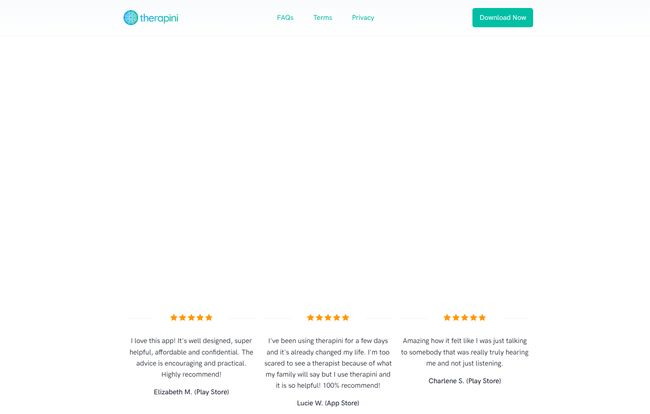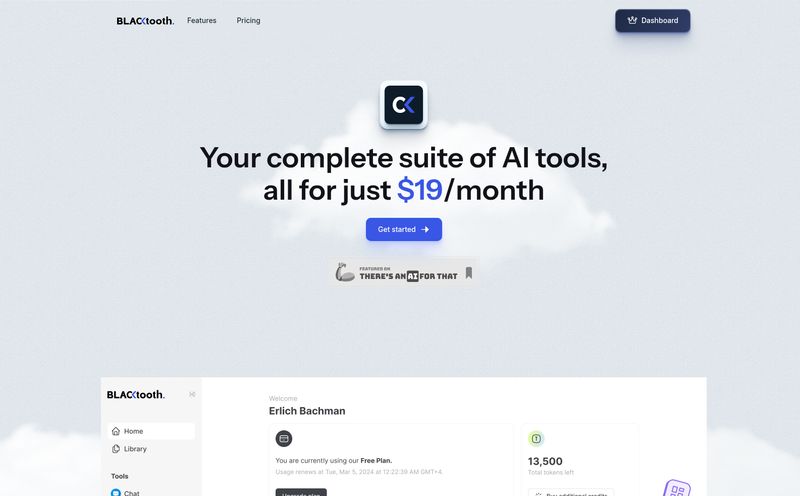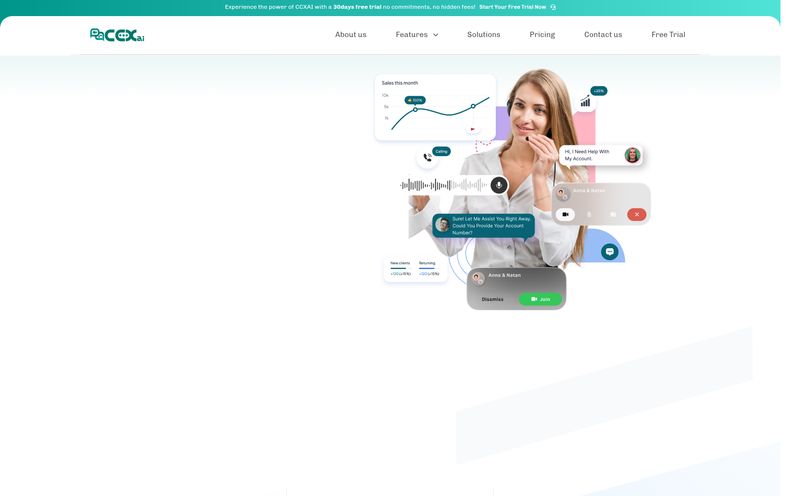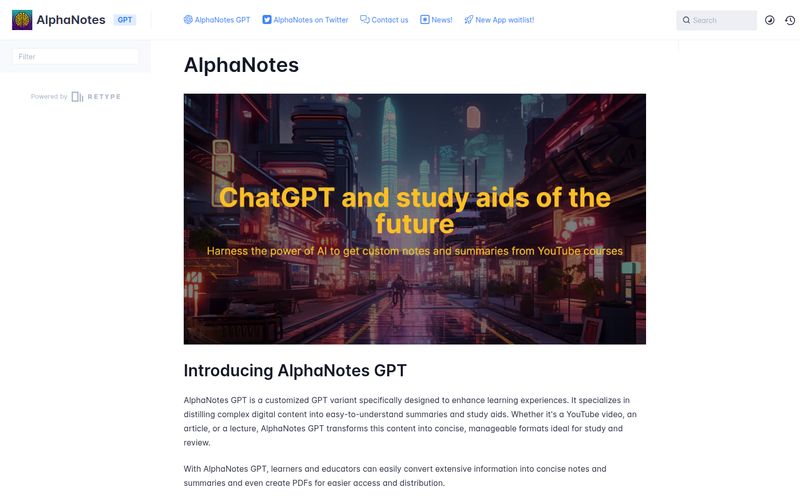In the world of SEO, we're constantly chasing algorithms, watching traffic spike and dip, and trying to decode the whims of Google. It can be a high-stress gig. And I've noticed, it's not just our industry—it feels like everyone is looking for a little more support these days. The problem? Traditional therapy can be expensive, hard to schedule, and for some, there's still a stigma attached. It’s a huge barrier.
So, when I stumbled upon a tool called therapini, my professional curiosity was immediately piqued. An AI therapist, available 24/7, right from your phone? It sounds like something straight out of a sci-fi movie. But in an age where AI can write code and create art, maybe an AI listening ear isn't so far-fetched. I had to see what it was all about.
">
So, What Exactly Is Therapini?
At its core, therapini is a personal AI therapist designed to be a constant companion for your mental and emotional well-being. Imagine having a sounding board that never sleeps, never gets tired of listening, and is always just a tap away. You can talk to it by typing out your thoughts or by using your voice, which is a fantastic touch for those of us who process things better by speaking them aloud.
The platform positions itself not as a clinical tool, but as a support system. It's there to help you navigate a whole spectrum of challenges. We're talking about everything from the daily grind of anxiety and relationship issues to more specific and heavy topics like PTSD, grief and loss, OCD, addiction, and even providing a safe space for LGBTQ+ and multicultural counseling. It’s an ambitious list, and frankly, an impressive one.
My First Impressions and The User Experience
Getting started feels familiar to anyone who has used a modern app. You download it from the App Store or Google Play, and you're in. The design is clean, minimalist, and inviting. No clutter, no confusing menus. It feels designed to be calming, which is, you know, the whole point. One of the first things you'll notice is the offer of a free trial—15 minutes to start, plus an extra 5 minutes free every single day. That’s a pretty smart way to let people get a feel for it without immediate commitment.

Visit therapini
Based on the user reviews I've seen, people are connecting with it. One user, Lucie W., mentioned she was too scared to see a human therapist but found therapini “so helpful.” Another, Charlene S., said it felt like she was “really truly hearing me and not just listening.” That’s a subtle but powerful distinction, isn't it? It suggests the AI is programmed to be more than just a passive chatbot; it’s designed to be an active participant in the conversation.
The Good, The Bad, and The AI
No tool is perfect, especially one venturing into territory as complex as human emotion. So let's break down what I see as the major wins and the critical warnings.
The Upside: Why You Might Genuinely Love It
The most obvious benefit is the 24/7 availability. Your anxiety doesn't clock out at 5 PM, and your thoughts don't always wait for a scheduled appointment. Having an outlet at 3 AM can be a game-changer. Then there's the privacy. For many, the fear of judgment is a real hurdle. Talking to an AI can feel like a truly safe, confidential space to open up without reservation. It’s a judgment-free zone, by design.
And let’s not forget the cost. The company claims it can save users up to 97% compared to traditional therapy. That is a massive claim and could make mental wellness support accessible to a whole new group of people who were previously priced out. It's a digital life raft in what can be a very expensive sea of mental healthcare.
">
Important Caveats: Understanding Its Limits
This is the part I need to put in bold, flashing neon letters. Therapini is NOT a doctor. The platform is very clear about this, and it's our responsibility as users to understand it. This AI cannot diagnose you with depression, anxiety, or any other condition. It is not a substitute for professional medical advice, diagnosis, or treatment from a licensed professional.
Think of it as a mental wellness sparring partner or a supportive friend, not a licensed clinical psychologist. More importantly, it is not for emergencies. If you are in a crisis or feel you are a danger to yourself or others, you need to contact a human healthcare provider or emergency services immediately. An AI, no matter how sophisticated, isn't equipped for that.
Let's Talk Money: The Pricing Puzzle
Okay, so how much does this affordable therapy actually cost? Well, that's where things get a little funny. When I went to hunt down the exact subscription costs on their website, I was greeted by a classic '404 Page Not Found' error. A little web dev hiccup, perhaps? Or maybe the AI is just too busy helping people to update the HTML. It happens to the best of us.
While the exact pricing remains a bit of a mystery for now, the '97% cheaper' claim gives us a strong hint. It's likely a subscription model, and if that claim holds water, it’s going to be significantly more accessible than the typical $100-$200 per session for human therapy. The free trial (15 initial minutes + 5 daily minutes) is your best bet to see if its worth the investment for you, whatever that investment turns out to be.
">
So, Who Is Therapini Really For?
In my opinion, therapini fits a few key profiles perfectly. It's for the person who needs a space to vent and process their thoughts without worrying about schedules or judgment. It’s for someone who is curious about therapy but not quite ready to take the leap into seeing a person. It could also be an amazing supplementary tool for people who are already in therapy but want a little extra support between sessions.
It's not a replacement for deep, long-term psychotherapy with a human. But as a tool for promoting self-awareness, offering encouragement, and providing a consistent, supportive presence, it has some serious potential.
Final Thoughts
I started out skeptical, I'll admit. But the more I look at therapini, the more I see its place. We're in a new era of technology, and tools like this are pushing the boundaries of what we thought was possible. As long as we walk in with our eyes wide open, understanding what it is—and what it isn't—therapini could genuinely help a lot of people feel a little less alone in their own heads. And in today's world, that's something worth talking about.
Frequently Asked Questions
Is therapini a real, licensed therapist?
No, and this is the most important thing to know. Therapini is an advanced AI, not a human licensed mental health professional. It provides support and promotes well-being but does not offer medical advice or diagnosis.
Is therapini completely free to use?
It offers a free trial that includes an initial 15 minutes and 5 free minutes every day. Beyond that, it's expected to be a subscription-based service, though exact pricing isn't publicly listed at the moment.
Are my conversations with therapini private?
Yes, the platform emphasizes privacy and confidentiality. The nature of talking to an AI rather than a person can provide a strong sense of security for users to share openly.
Can therapini diagnose my mental health condition?
Absolutely not. It is not a diagnostic tool. For a diagnosis of any condition, you must consult a qualified, human healthcare provider.
What should I do if I'm having a mental health emergency?
Do not use the app. If you are in a crisis, please contact a local emergency service, a crisis hotline, or a healthcare provider immediately. Therapini is not suitable for handling emergencies.
What kinds of topics can I discuss with the AI?
You can discuss a very wide range of issues, including anxiety, depression, relationship problems, PTSD, addiction, grief, OCD, parenting challenges, LGBTQ+ issues, and much more.
References and Sources
- Therapini Official Website
- National Institute of Mental Health - Technology and the Future of Mental Health Treatment



